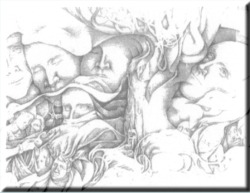 |
|
|
|
Graphic: Irene Frankel. |
||
|
|
 |
|
|
|
Graphic: Irene Frankel. |
||
|
|
| The Neovictorian/ Cochlea ("Neovic" for short) was founded in 1996, from a
wish to provide a venue for a kind of poetry which these days is often
considered "old-fashioned." This old-fashionedness is not a matter of form
only, but rather of a certain commitment to the subject matter, a sense of
speaking not only for the monadic self but for at least a potential
community. If this magazine had a slogan, it would The Neovic does not print prose. It seeks, instead, to present the poetry it receives as a conversation about the world. As to genre and style, the Neovic is probably the most diverse poetry magazine now published. All kinds and degrees of outward formality, all levels of diction; love poems, nature poems, religious poems, social satire, "light" verse, even, at times, rhymes that verge on the much-decried "greeting-card verse" (shouldn’t every poem contain a greeting?) – all are welcome, provided this particular poem has pith and coherency. Poetic dialogues are especially sought for. The coherency of the magazine is a matter not of stylistic uniformity but of meaningful juxtaposition. Each issue is a composition meant to suggest the "macropoem." Richard Moore, a distinguished formalist poet who has contributed many poems to The Neovictorian/Cochlea, has this to say about it: "There is no other magazine like Esther Cameron’s The Neovictorian/Cochlea. It harks back to a time, sorely missed in our own trivialized age, when poetry had and was expected to have serious social and philosophical concerns. It favors rhyme and meter, not for their own sakes, as elsewhere, but because those devices connect poetry with the general, unspecialized reader. And Cameron doesn’t play poetry’s empty and pointless celebrity game. She is unimpressed by ‘names’ and will print anyone that she feels has something to say. The result is a magazine of unique integrity." An explanation of the magazine’s two names: "Neovictorian" is a declaration of loyalty to a culture that offered poets an honorable place on the public stage, not only as singers but as thinkers who could help to sort out the complexities of modern knowledge & life. "Cochlea" is a declaration of loyalty to a poetry addressed first of all to the inner ear (in contradistinction to a certain current emphasis on "visual imagery"). The fact that this second name derives from anatomy rather than culture is meant as a reminder that all forms are grounded in the human form, and that all literary criteria are only approximations to something that must always be listened for without presuppositions. As the late Chaim Sokolik, physicist and poet, once, said: "You are forgetting your culture, you are becoming a poet."
|